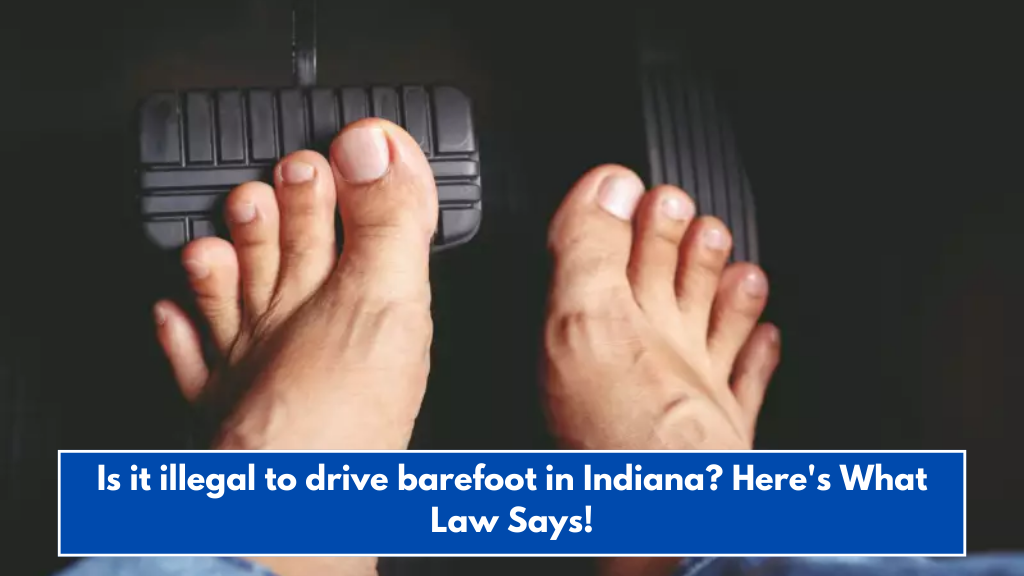When the summer heat rises, many people like to kick off their shoes while driving. It might feel comfortable, but is it safe? And more importantly, is it legal to drive barefoot in Indiana?
Let’s explore the rules, risks, and legal issues around barefoot driving in Indiana—so you can stay safe and avoid trouble if you’re ever in an accident.
Is Barefoot Driving Legal in Indiana?
Yes, it is legal to drive barefoot in Indiana. The state does not have any law that bans driving without shoes. Like most U.S. states, Indiana leaves the choice of footwear up to the driver.
However, just because it’s legal doesn’t mean it’s always safe.
Why Barefoot Driving Can Be Risky
Driving barefoot may feel freeing, but it can also be dangerous. Without shoes, your foot may slip off the pedals, especially in emergencies when you need to brake quickly. Shoes provide grip and support, helping you stay in better control.
According to the National Highway Traffic Safety Administration (NHTSA), around 94% of serious accidents are caused by driver-related factors—including poor control of the vehicle. While there’s no exact data on barefoot driving, foot slippage is known to be a contributing factor.
Can Barefoot Driving Affect Legal Liability in an Accident?
Even though it’s legal, barefoot driving could impact your case if you’re involved in an accident. If it’s proven that driving barefoot caused your foot to slip and contributed to the crash, you could be held partly at fault.
Indiana follows a modified comparative fault rule, meaning if you’re partly responsible, your compensation may be reduced by your percentage of fault. For example, if you’re 20% at fault, your settlement will be reduced by 20%.
If you’re in a crash and think barefoot driving might affect your case, speak to a car accident lawyer in Indiana. They can explain your legal rights and help you handle any issues with fault or insurance.
Will Insurance Cover an Accident if You Were Barefoot?
Most insurance companies don’t have rules that directly ban barefoot driving. But in some cases, an insurer might argue that driving without shoes was reckless or unsafe—and try to reduce or deny your claim.
That’s why it’s important to have a car wreck attorney on your side. A lawyer can help prove that driving barefoot didn’t cause the accident or wasn’t a major factor.
When Is Barefoot Driving Safer?
Surprisingly, there are some situations where driving barefoot may be safer than driving in bad footwear.
For example, flip-flops can slip off your feet or get caught under the pedals. Shoes with loose soles, heels, or slippery surfaces can also cause problems.
According to the AAA Foundation for Traffic Safety, loose footwear is a common cause of unintentional pedal mistakes. In such cases, barefoot driving might be the better option, though not always ideal.
What to Do After an Accident Involving Barefoot Driving
If you’re in a car crash and were driving barefoot, it’s best to talk to a car accident lawyer in Indiana. They’ll guide you through:
- Understanding if your choice of footwear could affect your case
- Dealing with insurance companies
- Gathering evidence and building a strong legal argument
Whether or not your feet played a role, a lawyer ensures your rights are protected and helps you seek fair compensation for injuries or damages.
Key Takeaways: Barefoot Driving in Indiana
- Driving barefoot in Indiana is legal, but it can increase accident risk.
- If barefoot driving is found to have caused or worsened an accident, you may be held partly at fault.
- Insurance companies may try to reduce or deny your claim if they see barefoot driving as reckless.
- Keep a pair of safe driving shoes in your car to avoid legal or safety issues.
- If you’re involved in a crash, especially one involving barefoot driving, consult a qualified car accident lawyer.














